美国信息自由法案-2002年版
美国信息自由法案

应该叫《信息自由法案》:1966年美国颁布的《信息自由法》,是一项旨在促进美国联邦政府信息公开化的行政法规。
其主要内容是:联邦政府的记录和档案除某些政府信息免于公开外,原则上向所有人开放;公民可以向任何一级政府机构提出查询、索取复印件的申请;政府机构必须公布本部门的建制和本部门各级组织受理信息咨询的查找程序、方法和项目,并提供信息分类索引;公民在查询信息的要求被拒绝后,可以向司法部门提起诉讼,并应得到法院的优先处理;行政、司法部门必须在一定的时效范围内处理有关信息公开申请和诉讼。
自1966年颁布此法案后,美国又对该法案进行了数次的修改与修订。
1974年对法案的修正,在政府信息免于公开范围内缩小了执法豁免与国家安全豁免的范围,并在程序方面进行了扩充,如收费、时限和法院的不公开审查等;1984年,国会废除了由1966年法案规定的法院应优先处理由公民查询信息引起的诉讼案件及司法部门应快速审查该类诉讼的规定;1986年的修正案则扩大了执法活动信息的豁免范围,增加了特殊执法活动记录的排除规定,并设立了新的收费与费率减免体系;1996年,美国政府颁布的《电子信息自由修正案》主要解决的是电子信息的公开问题以及行政机关积压信息申请等方面的问题。
本文为《信息自由法案》2002年修正本,译自美国司法部网站,是1986年《信息自由法案》与1996年《电子信息自由法案》的合订。
通过此法案,我们可以了解美国在政府信息公开方面的做法,并从中得到一定的借鉴。
美国信息自由法案(2002年修正本)美国法典第5篇第552节第552节:公共信息;机关规则、意见、命令、记录和程序:(a)各机关必须使公众能够得到以下信息:(1)作为对公众的指南,各机关应在联邦登记处将以下信息予以分别说明并及时公布:(A)总部及分部的介绍以及公众可以在哪些指定地方,通过什么方法,可以向该地方的雇员(如果是穿制服的机构,那么为公职人员)获取信息、提出要求或获取答复;(B) 阐明开发并确立本机关之各项功能的整体过程及办法,包括所有现行的正式与非正式的办事程序之性质和必备的条件;(C)程序规则,可获取的表格介绍或获取表格的地点及所有文件、报告或检查记录的范围与内容的指导;(D)本机关根据法律授权制定的普遍适用的实体规则,本机关制定和采取的基本政策的说明,或本机关采取的普遍适用的解释的说明;(E)上述各项的改正、修订或撤消。
美国网络空间治理的经验分析

美国网络空间治理的经验分析发布时间:2022-05-06T00:51:34.740Z 来源:《教育学文摘》2022年1月第2期作者:时瑞燕[导读] 网络空间安全和治理的重要性日益凸显,对现有的、基于工业社会的国家治理体系提出严峻的挑战。
时瑞燕(河南检察职业学院,河南郑州 451191)内容摘要:网络空间安全和治理的重要性日益凸显,对现有的、基于工业社会的国家治理体系提出严峻的挑战。
构造一个有效的、高效运行的国家网络空间战略管理体系,是美国网络实力的重要组成部分,将对我国的网络空间治理带来启示和意义。
关键词:网络空间;法治化;互联网治理美国是互联网的发源地,也是网络行业的引领者,关于互联网的治理机制,美国有一套较为成熟、有效的机制。
尽管政治体制不同,但关于网络科技方面的治理,很多国家都面临着相似的问题,研究美国的互联网治理经验对提高我国的网络空间治理水平是极有必要的。
经过研究,我们把美国关于网络空间治理的经验总结为以下五个方面:一、将网络治理纳入国家战略规划,注重顶层设计。
美国将网络空间的治理纳入其国家战略规划,非常重视网络治理的顶层设计。
美国制定了网络空间安全战略,主要包括关键基础设施、大型数据平台之安全防护、通信网络链路等方面。
在美国的国家战略体系中,维护网络空间安全的地位不断提升,在国家安全战略中的分量一直在不断加重,如今已成为美国的核心国家战略,并制定了相关的具体政策。
在克林顿总统执政期间,美国在1993年通过了《国家信息基础设施:行动动议》,在1998年推出了《关于美国关键基础设施保护的政策》,在2000 年制定了《保护美国的网络空间:信息系统保护国家计划》等宏观国家战略规划。
通过这些国家战略规划及具体政策的制定和实施,美国对网络关键基础设施进行全面建设,并对其给予基本保护。
美国一步步地建立了网络空间安全战略的防御机制。
发生在2001年的“9· 11事件”是美国的国家网络安全治理战略急速转向的一个标志,网络空间的安全战略部署由防御变为攻防兼备。
美国信息自由法
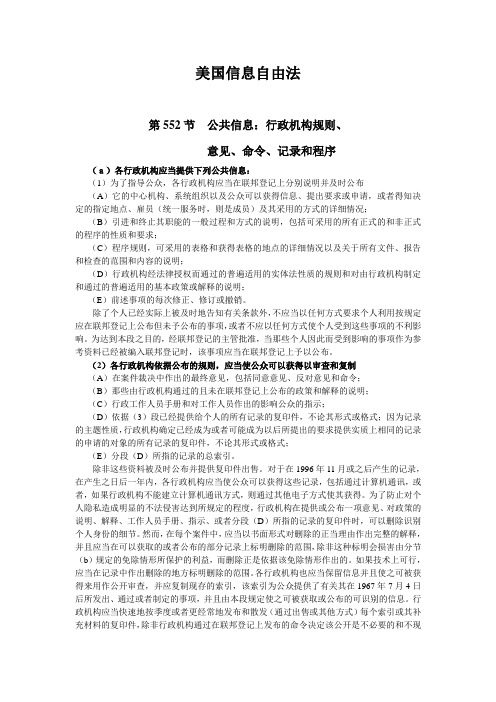
美国信息自由法第552节公共信息:行政机构规则、意见、命令、记录和程序(a)各行政机构应当提供下列公共信息:(1)为了指导公众,各行政机构应当在联邦登记上分别说明并及时公布(A)它的中心机构、系统组织以及公众可以获得信息、提出要求或申请,或者得知决定的指定地点、雇员(统一服务时,则是成员)及其采用的方式的详细情况;(B)引进和终止其职能的一般过程和方式的说明,包括可采用的所有正式的和非正式的程序的性质和要求;(C)程序规则,可采用的表格和获得表格的地点的详细情况以及关于所有文件、报告和检查的范围和内容的说明;(D)行政机构经法律授权而通过的普遍适用的实体法性质的规则和对由行政机构制定和通过的普遍适用的基本政策或解释的说明;(E)前述事项的每次修正、修订或撤销。
除了个人已经实际上被及时地告知有关条款外,不应当以任何方式要求个人利用按规定应在联邦登记上公布但未予公布的事项,或者不应以任何方式使个人受到这些事项的不利影响。
为达到本段之目的,经联邦登记的主管批准,当那些个人因此而受到影响的事项作为参考资料已经被编入联邦登记时,该事项应当在联邦登记上予以公布。
(2)各行政机构依据公布的规则,应当使公众可以获得以审查和复制(A)在案件裁决中作出的最终意见,包括同意意见、反对意见和命令;(B)那些由行政机构通过的且未在联邦登记上公布的政策和解释的说明;(C)行政工作人员手册和对工作人员作出的影响公众的指示;(D)依据(3)段已经提供给个人的所有记录的复印件,不论其形式或格式;因为记录的主题性质,行政机构确定已经成为或者可能成为以后所提出的要求提供实质上相同的记录的申请的对象的所有记录的复印件,不论其形式或格式;(E)分段(D)所指的记录的总索引。
除非这些资料被及时公布并提供复印件出售。
对于在1996年11月或之后产生的记录,在产生之日后一年内,各行政机构应当使公众可以获得这些记录,包括通过计算机通讯,或者,如果行政机构不能建立计算机通讯方式,则通过其他电子方式使其获得。
信息安全与信息自由的法律探讨——以美国为例
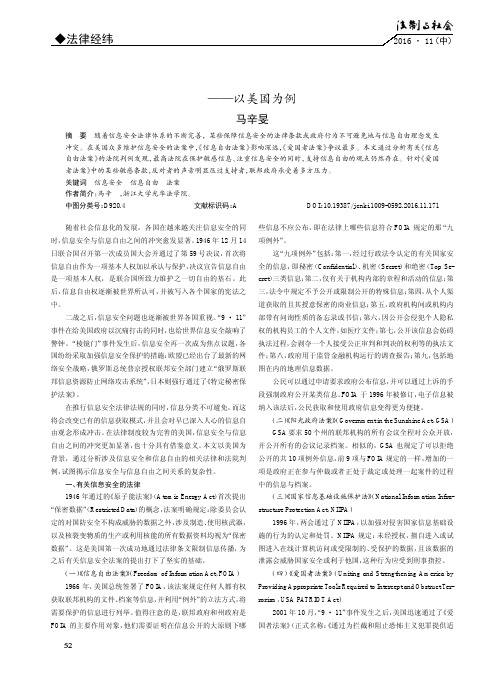
◆法律经纬2016・11(中)信息安全与信息自由的法律探讨——以美国为例马辛旻摘要随着信息安全法律体系的不断完善,某些保障信息安全的法律条款或政府行为不可避免地与信息自由理念发生冲突。
在美国众多维护信息安全的法案中,《信息自由法案》影响深远,《爱国者法案》争议最多。
本文通过分析有关《信息自由法案》的法院判例发现,最高法院在保护敏感信息、注重信息安全的同时,支持信息自由的观点仍然存在。
针对《爱国者法案》中的某些敏感条款,反对者的声音明显压过支持者,联邦政府承受着多方压力。
关键词信息安全信息自由法案作者简介:马辛旻,浙江大学光华法学院。
中图分类号:D920.4文献标识码:A DOI:10.19387/ki.1009-0592.2016.11.171随着社会信息化的发展,各国在越来越关注信息安全的同时,信息安全与信息自由之间的冲突愈发显著。
1946年12月14日联合国召开第一次成员国大会并通过了第59号决议,首次将信息自由作为一项基本人权加以承认与保护,决议宣告信息自由是一项基本人权,是联合国所致力维护之一切自由的基石。
此后,信息自由权逐渐被世界所认可,并被写入各个国家的宪法之中。
二战之后,信息安全问题也逐渐被世界各国重视。
“9・11”事件在给美国政府以沉痛打击的同时,也给世界信息安全敲响了警钟。
“棱镜门”事件发生后,信息安全再一次成为焦点议题,各国纷纷采取加强信息安全保护的措施:欧盟已经出台了最新的网络安全战略,俄罗斯总统普京授权联邦安全部门建立“俄罗斯联邦信息资源防止网络攻击系统”,日本则强行通过了《特定秘密保护法案》。
在推行信息安全法律法规的同时,信息分类不可避免,而这将会改变已有的信息获取模式,并且会对早已深入人心的信息自由观念形成冲击。
在法律制度较为完善的美国,信息安全与信息自由之间的冲突更加显著,也十分具有借鉴意义。
本文以美国为背景,通过分析涉及信息安全和信息自由的相关法律和法院判例,试图揭示信息安全与信息自由之间关系的复杂性。
美国《信息自由法》中的“豁免公开信息例外”的论文
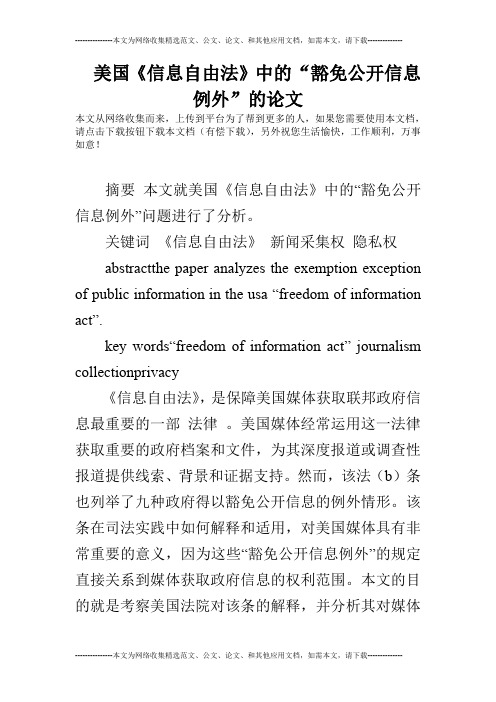
美国《信息自由法》中的“豁免公开信息例外”的论文本文从网络收集而来,上传到平台为了帮到更多的人,如果您需要使用本文档,请点击下载按钮下载本文档(有偿下载),另外祝您生活愉快,工作顺利,万事如意!摘要本文就美国《信息自由法》中的“豁免公开信息例外”问题进行了分析。
关键词《信息自由法》新闻采集权隐私权abstractthe paper analyzes the exemption exception of public information in the usa “fr eedom of information act”.key words“freedom of information act” journalism collectionprivacy《信息自由法》,是保障美国媒体获取联邦政府信息最重要的一部法律。
美国媒体经常运用这一法律获取重要的政府档案和文件,为其深度报道或调查性报道提供线索、背景和证据支持。
然而,该法(b)条也列举了九种政府得以豁免公开信息的例外情形。
该条在司法实践中如何解释和适用,对美国媒体具有非常重要的意义,因为这些“豁免公开信息例外”的规定直接关系到媒体获取政府信息的权利范围。
本文的目的就是考察美国法院对该条的解释,并分析其对媒体获取政府信息权利的影响。
一、背景与问题为回应新闻界和社会大众对知情权的强烈诉求,美国国会于1966年通过了对美国新闻工作具有重要影响的《信息自由法》。
该法的立法目的是强制联邦政府机构向公众开放政府档案和文件,以实现人民对政府行为的充分了解和监督。
该法确立了四项基本的原则:信息公开是原则,不公开是例外;人人拥有平等获取信息的权利;由政府而非申请人对拒绝提供信息承担举证责任;不能合理获取信息的人,有权向法院寻求救济。
美国媒体经常运用《信息自由法》向政府索取敏感的或重要的文件,为其深度报道或调查性报道提供线索、背景资料或证据。
例如,1995年,俄亥俄州的《代顿每日新闻》(dayton daily news)运用《信息自由法》得到了部分军方文件。
美国信息自由法上过程性信息的豁免公开基于判例视角的反思与借鉴

三、结论
三、结论
美国的信息自由法案及其相关判例在过程性信息的豁免公开方面提供了有益 的实践经验。这些经验对于我国政府信息公开制度的完善具有重要的借鉴意义。 在保障公众知情权的我们应当充分考虑到政府决策的效率和独立性,合理确定过 程性信息的豁免公开范围和标准。通过这种方式,我们可以更好地实现政府信息 公开制度的价值和目标。
二、判例视角下的反思与借鉴
3、对我国政府信息公开制度的借鉴。美国的FOIA及其相关判例为我国政府信 息公开制度提供了重要的借鉴。首先,我们应当在制度上明确政府信息公开的基 本原则和程序,保障公众的知情权;其次,针对过程性信息,应当设立合理的豁 免公开机制,明确豁免公开的范围和标准。在保障公众知情权的同时,也要考虑 到政府决策的效率和独立性;最后,应加强司法审查力度,确保在过程性信息公 开的问题上实现公正和公平。
(一)建立和完善过程性信息的 豁免公开制度
(一)建立和完善过程性信息的豁免公开制度
我国信息公开制度应当明确规定过程性信息的豁免公开范围和标准。在制定 信息公开目录时,应当将涉及国家安全、商业秘密等过程性信息排除在公开范围 之外。同时,对于其他涉及公众利益的内部决策信息,也应当根据实际情况予以 豁免公开。这样可以保障信息公开的公正性和透明度,同时防止不必要的信息泄 露和滥用。
(二)涉及商业秘密的过程性信息的豁免公开
因此,法院最终裁定微软公司提供的过程信息的豁免公开原则。
四、对我国的借鉴意义
四、对我国的借鉴意义
通过对美国信息自由法上过程性信息豁免公开制度的判例分析,我们可以看 到这一制度在保障信息公开的公正性和透明度的同时,也防止了不必要的信息泄 露和滥用。这对于我国信息公开制度的完善具有重要的借鉴意义。
在美国信息自由法上,过程性信息是指政府在进行决策过程中形成的信息。 这些信息通常包括会议纪要、备忘录、信函、电子邮件等。由于这些信息涉及到 政府的内部决策过程,因此其公开可能会影响政府的决策效率和效果,甚至会损 害政府与公民之间的信任关系。因此,美国信息自由法对过程性信息实施了豁免 公开制度。
美国信息自由法 The Freedom of Information Act
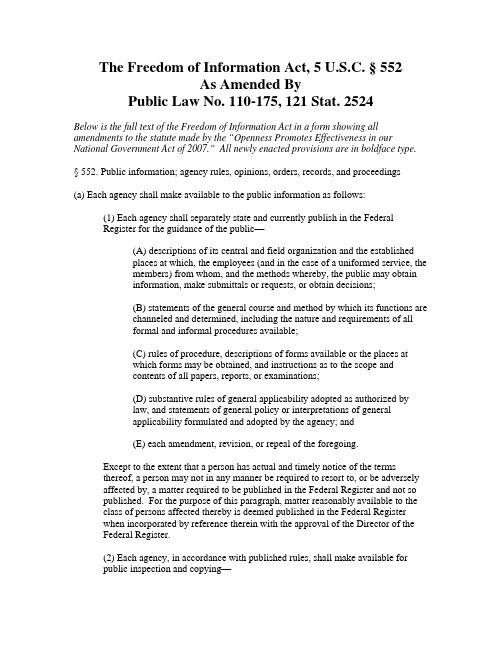
The Freedom of Information Act, 5 U.S.C. § 552As Amended ByPublic Law No. 110-175, 121 Stat. 2524Below is the full text of the Freedom of Information Act in a form showing all amendments to the statute made by the “Openness Promotes Effectiveness in our National Government Act of 2007.” All newly enacted provisions are in boldface type.§ 552. Public information; agency rules, opinions, orders, records, and proceedings(a) Each agency shall make available to the public information as follows:(1) Each agency shall separately state and currently publish in the FederalRegister for the guidance of the public—(A) descriptions of its central and field organization and the establishedplaces at which, the employees (and in the case of a uniformed service, themembers) from whom, and the methods whereby, the public may obtaininformation, make submittals or requests, or obtain decisions;(B) statements of the general course and method by which its functions arechanneled and determined, including the nature and requirements of allformal and informal procedures available;(C) rules of procedure, descriptions of forms available or the places atwhich forms may be obtained, and instructions as to the scope andcontents of all papers, reports, or examinations;(D) substantive rules of general applicability adopted as authorized bylaw, and statements of general policy or interpretations of generalapplicability formulated and adopted by the agency; and(E) each amendment, revision, or repeal of the foregoing.Except to the extent that a person has actual and timely notice of the termsthereof, a person may not in any manner be required to resort to, or be adverselyaffected by, a matter required to be published in the Federal Register and not sopublished. For the purpose of this paragraph, matter reasonably available to theclass of persons affected thereby is deemed published in the Federal Registerwhen incorporated by reference therein with the approval of the Director of theFederal Register.(2) Each agency, in accordance with published rules, shall make available forpublic inspection and copying—(A) final opinions, including concurring and dissenting opinions, as wellas orders, made in the adjudication of cases;(B) those statements of policy and interpretations which have beenadopted by the agency and are not published in the Federal Register;(C) administrative staff manuals and instructions to staff that affect amember of the public;(D) copies of all records, regardless of form or format, which have beenreleased to any person under paragraph (3) and which, because of thenature of their subject matter, the agency determines have become or arelikely to become the subject of subsequent requests for substantially thesame records; and(E) a general index of the records referred to under subparagraph (D); unless the materials are promptly published and copies offered for sale. For records created on or after November 1, 1996, within one year after such date, each agency shall make such records available, including by computer telecommunications or, if computer telecommunications means have not been established by the agency, by other electronic means. To the extent required to prevent a clearly unwarranted invasion of personal privacy, an agency may delete identifying details when it makes available or publishes an opinion, statement of policy, interpretation, staff manual, instruction, or copies of records referred to in subparagraph (D). However, in each case the justification for the deletion shall be explained fully in writing, and the extent of such deletion shall be indicated on the portion of the record which is made available or published, unless including that indication would harm an interest protected by the exemption in subsection (b) under which the deletion is made. If technically feasible, the extent of the deletion shall be indicated at the place in the record where the deletion was made. Each agency shall also maintain and make available for public inspection and copying current indexes providing identifying information for the public as to any matter issued, adopted, or promulgated after July 4, 1967, and required by this paragraph to be made available or published. Each agency shall promptly publish, quarterly or more frequently, and distribute (by sale or otherwise) copies of each index or supplements thereto unless it determines by order published in the Federal Register that the publication would be unnecessary and impracticable, in which case the agency shall nonetheless provide copies of an index on request at a cost not to exceed the direct cost of duplication. Each agency shall make the index referred to in subparagraph (E) available by computer telecommunications by December 31, 1999. A final order, opinion, statement of policy, interpretation, or staff manual or instruction that affects a member of the public may be relied on, used, or cited as precedent by an agency against a party other than an agency only if—(i) it has been indexed and either made available or published asprovided by this paragraph; or(ii) the party has actual and timely notice of the terms thereof.(3)(A) Except with respect to the records made available under paragraphs (1) and (2) of this subsection, and except as provided in subparagraph (E), each agency, upon any request for records which (i) reasonably describes such records and (ii) is made in accordance with published rules stating the time, place, fees (if any), and procedures to be followed, shall make the records promptly available to any person.(B) In making any record available to a person under this paragraph, anagency shall provide the record in any form or format requested by theperson if the record is readily reproducible by the agency in that form orformat. Each agency shall make reasonable efforts to maintain its recordsin forms or formats that are reproducible for purposes of this section.(C) In responding under this paragraph to a request for records, an agencyshall make reasonable efforts to search for the records in electronic formor format, except when such efforts would significantly interfere with theoperation of the agency's automated information system.(D) For purposes of this paragraph, the term "search" means to review,manually or by automated means, agency records for the purpose oflocating those records which are responsive to a request.(E) An agency, or part of an agency, that is an element of the intelligencecommunity (as that term is defined in section 3(4) of the National Security Act of 1947 (50 U.S.C. 401a(4))) shall not make any record availableunder this paragraph to—(i) any government entity, other than a State, territory,commonwealth, or district of the United States, or any subdivisionthereof; or(ii) a representative of a government entity described in clause (i).(4)(A)(i) In order to carry out the provisions of this section, each agency shall promulgate regulations, pursuant to notice and receipt of public comment, specifying the schedule of fees applicable to the processing of requests under this section and establishing procedures and guidelines for determining when such fees should be waived or reduced. Such schedule shall conform to the guidelines which shall be promulgated, pursuant to notice and receipt of public comment, by the Director of the Office of Management and Budget and which shall provide for a uniform schedule of fees for all agencies.(ii) Such agency regulations shall provide that—(I) fees shall be limited to reasonable standard charges fordocument search, duplication, and review, when records arerequested for commercial use;(II) fees shall be limited to reasonable standard charges fordocument duplication when records are not sought forcommercial use and the request is made by an educationalor noncommercial scientific institution, whose purpose isscholarly or scientific research; or a representative of thenews media; and(III) for any request not described in (I) or (II), fees shall belimited to reasonable standard charges for document searchand duplication.In this clause, the term ‘a representative of the news media’ means any person or entity that gathers information of potential interest to a segment of the public, uses its editorial skills to turn the raw materials into a distinct work, and distributes that work to an audience. In this clause, the term‘news’ means information that is about current events or that would be of current interest to the public. Examples of news-media entities are television or radio stations broadcasting to the public at large and publishers of periodicals (but only if such entities qualify as disseminators of ‘news’) who make their products available for purchase by or subscription by or free distribution to the general public. These examples are not all-inclusive. Moreover, as methods of news delivery evolve (for example, the adoption of the electronic dissemination of newspapers through telecommunications services), such alternative media shall be considered to be news-media entities. A freelance journalist shall be regarded as working for a news-media entity if the journalist can demonstrate a solid basis for expecting publication through that entity, whether or not the journalist is actually employed by the entity. A publication contract would present a solid basis for such an expectation; the Government may also consider the past publication record of the requester in making such a determination.(iii) Documents shall be furnished without any charge or at a charge reduced below the fees established under clause (ii) if disclosure of the information is in the public interest because it is likely to contribute significantly to public understanding of theoperations or activities of the government and is not primarily inthe commercial interest of the requester.(iv) Fee schedules shall provide for the recovery of only the directcosts of search, duplication, or review. Review costs shall includeonly the direct costs incurred during the initial examination of adocument for the purposes of determining whether the documentsmust be disclosed under this section and for the purposes ofwithholding any portions exempt from disclosure under thissection. Review costs may not include any costs incurred inresolving issues of law or policy that may be raised in the course of processing a request under this section. No fee may be charged byany agency under this section—(I) if the costs of routine collection and processing of thefee are likely to equal or exceed the amount of the fee; or(II) for any request described in clause (ii)(II) or (III) ofthis subparagraph for the first two hours of search time orfor the first one hundred pages of duplication.(v) No agency may require advance payment of any fee unless therequester has previously failed to pay fees in a timely fashion, orthe agency has determined that the fee will exceed $250.(vi) Nothing in this subparagraph shall supersede fees chargeableunder a statute specifically providing for setting the level of feesfor particular types of records.(vii) In any action by a requester regarding the waiver of feesunder this section, the court shall determine the matter de novo:Provided, That the court's review of the matter shall be limited tothe record before the agency.(viii) An agency shall not assess search fees (or in the case of arequester described under clause (ii)(II), duplication fees)under this subparagraph if the agency fails to comply with anytime limit under paragraph (6), if no unusual or exceptionalcircumstances (as those terms are defined for purposes ofparagraphs (6)(B) and (C), respectively) apply to theprocessing of the request. [Effective one year from date ofenactment](B) On complaint, the district court of the United States in the district in which the complainant resides, or has his principal place of business, or in which the agency records are situated, or in the District of Columbia, hasjurisdiction to enjoin the agency from withholding agency records and to order the production of any agency records improperly withheld from the complainant. In such a case the court shall determine the matter de novo, and may examine the contents of such agency records in camera to determine whether such records or any part thereof shall be withheld under any of the exemptions set forth in subsection (b) of this section, and the burden is on the agency to sustain its action. In addition to any other matters to which a court accords substantial weight, a court shall accord substantial weight to an affidavit of an agency concerning the agency's determination as to technical feasibility under paragraph (2)(C) and subsection (b) and reproducibility under paragraph (3)(B).(C) Notwithstanding any other provision of law, the defendant shall serve an answer or otherwise plead to any complaint made under this subsection within thirty days after service upon the defendant of the pleading in which such complaint is made, unless the court otherwise directs for good cause is shown.[(D) Repealed. Pub. L. 98-620, title IV, Sec. 402(2), Nov. 8, 1984, 98 Stat. 3357.](E)(i) The court may assess against the United States reasonable attorney fees and other litigation costs reasonably incurred in any case under this section in which the complainant has substantially prevailed.(ii) For purposes of this subparagraph, a complainant hassubstantially prevailed if the complainant has obtained reliefthrough either—(I) a judicial order, or an enforceable written agreementor consent decree; or(II) a voluntary or unilateral change in position by theagency, if the complainant’s claim is not insubstantial.(F)(i) Whenever the court orders the production of any agency records improperly withheld from the complainant and assesses against the United States reasonable attorney fees and other litigation costs, and the court additionally issues a written finding that the circumstances surrounding the withholding raise questions whether agency personnel acted arbitrarily or capriciously with respect to the withholding, the Special Counsel shall promptly initiate a proceeding to determine whether disciplinary action is warranted against the officer or employee who was primarily responsible for the withholding. The Special Counsel, after investigation and consideration of the evidence submitted, shall submit his findings and recommendations to the administrative authority of the agency concernedand shall send copies of the findings and recommendations to the officeror employee or his representative. The administrative authority shall takethe corrective action that the Special Counsel recommends.(ii) The Attorney General shall—(I) notify the Special Counsel of each civil actiondescribed under the first sentence of clause (i); and(II) annually submit a report to Congress on thenumber of such civil actions in the preceding year.(iii) The Special Counsel shall annually submit a report toCongress on the actions taken by the Special Counsel underclause (i).(G) In the event of noncompliance with the order of the court, the districtcourt may punish for contempt the responsible employee, and in the caseof a uniformed service, the responsible member.(5) Each agency having more than one member shall maintain and make available for public inspection a record of the final votes of each member in every agency proceeding.(6)(A) Each agency, upon any request for records made under paragraph (1), (2), or (3) of this subsection, shall—(i) determine within 20 days (excepting Saturdays, Sundays, andlegal public holidays) after the receipt of any such request whetherto comply with such request and shall immediately notify theperson making such request of such determination and the reasonstherefor, and of the right of such person to appeal to the head of theagency any adverse determination; and(ii) make a determination with respect to any appeal within twentydays (excepting Saturdays, Sundays, and legal public holidays)after the receipt of such appeal. If on appeal the denial of therequest for records is in whole or in part upheld, the agency shallnotify the person making such request of the provisions for judicialreview of that determination under paragraph (4) of thissubsection.The 20-day period under clause (i) shall commence on the dateon which the request is first received by the appropriatecomponent of the agency, but in any event not later than tendays after the request is first received by any component of theagency that is designated in the agency’s regulations under thissection to receive requests under this section. The 20-dayperiod shall not be tolled by the agency except—(I) that the agency may make one request to therequester for information and toll the 20-day periodwhile it is awaiting such information that it hasreasonably requested from the requester under thissection; or(II) if necessary to clarify with the requester issuesregarding fee assessment. In either case, the agency’sreceipt of the requester’s response to the agency’srequest for information or clarification ends the tollingperiod.[Effective one year from date of enactment](B)(i) In unusual circumstances as specified in this subparagraph, the time limits prescribed in either clause (i) or clause (ii) of subparagraph (A) may be extended by written notice to the person making such request setting forth the unusual circumstances for such extension and the date on which a determination is expected to be dispatched. No such notice shall specify a date that would result in an extension for more than ten working days, except as provided in clause (ii) of this subparagraph.(ii) With respect to a request for which a written notice underclause (i) extends the time limits prescribed under clause (i) ofsubparagraph (A), the agency shall notify the person making therequest if the request cannot be processed within the time limitspecified in that clause and shall provide the person an opportunityto limit the scope of the request so that it may be processed withinthat time limit or an opportunity to arrange with the agency analternative time frame for processing the request or a modifiedrequest. To aid the requester, each agency shall make availableits FOIA Public Liaison, who shall assist in the resolution ofany disputes between the requester and the agency. [Effectiveone year from date of enactment]. Refusal by the person toreasonably modify the request or arrange such an alternative timeframe shall be considered as a factor in determining whetherexceptional circumstances exist for purposes of subparagraph (C).(iii) As used in this subparagraph, "unusual circumstances" means,but only to the extent reasonably necessary to the properprocessing of the particular requests—(I) the need to search for and collect the requested recordsfrom field facilities or other establishments that are separatefrom the office processing the request;(II) the need to search for, collect, and appropriatelyexamine a voluminous amount of separate and distinctrecords which are demanded in a single request; or(III) the need for consultation, which shall be conductedwith all practicable speed, with another agency having asubstantial interest in the determination of the request oramong two or more components of the agency havingsubstantial subject-matter interest therein.(iv) Each agency may promulgate regulations, pursuant to noticeand receipt of public comment, providing for the aggregation ofcertain requests by the same requestor, or by a group of requestorsacting in concert, if the agency reasonably believes that suchrequests actually constitute a single request, which wouldotherwise satisfy the unusual circumstances specified in thissubparagraph, and the requests involve clearly related matters.Multiple requests involving unrelated matters shall not beaggregated.(C)(i) Any person making a request to any agency for records under paragraph (1), (2), or (3) of this subsection shall be deemed to have exhausted his administrative remedies with respect to such request if the agency fails to comply with the applicable time limit provisions of this paragraph. If the Government can show exceptional circumstances exist and that the agency is exercising due diligence in responding to the request, the court may retain jurisdiction and allow the agency additional time to complete its review of the records. Upon any determination by an agency to comply with a request for records, the records shall be made promptly available to such person making such request. Any notification of denial of any request for records under this subsection shall set forth the names and titles or positions of each person responsible for the denial of such request.(ii) For purposes of this subparagraph, the term "exceptionalcircumstances" does not include a delay that results from apredictable agency workload of requests under this section, unlessthe agency demonstrates reasonable progress in reducing itsbacklog of pending requests.(iii) Refusal by a person to reasonably modify the scope of arequest or arrange an alternative time frame for processing arequest (or a modified request) under clause (ii) after being givenan opportunity to do so by the agency to whom the person madethe request shall be considered as a factor in determining whetherexceptional circumstances exist for purposes of this subparagraph.(D)(i) Each agency may promulgate regulations, pursuant to notice and receipt of public comment, providing for multitrack processing of requests for records based on the amount of work or time (or both) involved in processing requests.(ii) Regulations under this subparagraph may provide a personmaking a request that does not qualify for the fastest multitrackprocessing an opportunity to limit the scope of the request in orderto qualify for faster processing.(iii) This subparagraph shall not be considered to affect therequirement under subparagraph (C) to exercise due diligence.(E)(i) Each agency shall promulgate regulations, pursuant to notice and receipt of public comment, providing for expedited processing of requests for records—(I) in cases in which the person requesting the recordsdemonstrates a compelling need; and(II) in other cases determined by the agency.(ii) Notwithstanding clause (i), regulations under this subparagraph must ensure—(I) that a determination of whether to provide expeditedprocessing shall be made, and notice of the determinationshall be provided to the person making the request, within10 days after the date of the request; and(II) expeditious consideration of administrative appeals ofsuch determinations of whether to provide expeditedprocessing.(iii) An agency shall process as soon as practicable any request forrecords to which the agency has granted expedited processingunder this subparagraph. Agency action to deny or affirm denial ofa request for expedited processing pursuant to this subparagraph,and failure by an agency to respond in a timely manner to such arequest shall be subject to judicial review under paragraph (4),except that the judicial review shall be based on the record beforethe agency at the time of the determination.(iv) A district court of the United States shall not have jurisdictionto review an agency denial of expedited processing of a request forrecords after the agency has provided a complete response to therequest.(v) For purposes of this subparagraph, the term "compelling need"means—(I) that a failure to obtain requested records on an expeditedbasis under this paragraph could reasonably be expected topose an imminent threat to the life or physical safety of anindividual; or(II) with respect to a request made by a person primarilyengaged in disseminating information, urgency to informthe public concerning actual or alleged FederalGovernment activity.(vi) A demonstration of a compelling need by a person making arequest for expedited processing shall be made by a statementcertified by such person to be true and correct to the best of suchperson's knowledge and belief.(F) In denying a request for records, in whole or in part, an agency shallmake a reasonable effort to estimate the volume of any requested matterthe provision of which is denied, and shall provide any such estimate tothe person making the request, unless providing such estimate would harm an interest protected by the exemption in subsection (b) pursuant to whichthe denial is made.(7) Each agency shall—(A) establish a system to assign an individualized tracking number foreach request received that will take longer than ten days to processand provide to each person making a request the tracking numberassigned to the request; and(B) establish a telephone line or Internet service that providesinformation about the status of a request to the person making therequest using the assigned tracking number, including—(i) the date on which the agency originally received the request;and(ii) an estimated date on which the agency will complete actionon the request.[Effective one year from date of enactment](b) This section does not apply to matters that are—(1)(A) specifically authorized under criteria established by an Executive order tobe kept secret in the interest of national defense or foreign policy and (B) are infact properly classified pursuant to such Executive order;(2) related solely to the internal personnel rules and practices of an agency;(3) specifically exempted from disclosure by statute (other than section 552b ofthis title), provided that such statute (A) requires that the matters be withheld from the public in such a manner as to leave no discretion on the issue, or (B)establishes particular criteria for withholding or refers to particular types ofmatters to be withheld;(4) trade secrets and commercial or financial information obtained from a personand privileged or confidential;(5) inter-agency or intra-agency memorandums or letters which would not beavailable by law to a party other than an agency in litigation with the agency;(6) personnel and medical files and similar files the disclosure of which wouldconstitute a clearly unwarranted invasion of personal privacy;(7) records or information compiled for law enforcement purposes, but only to theextent that the production of such law enforcement records or information (A)could reasonably be expected to interfere with enforcement proceedings, (B)would deprive a person of a right to a fair trial or an impartial adjudication, (C)could reasonably be expected to constitute an unwarranted invasion of personalprivacy, (D) could reasonably be expected to disclose the identity of aconfidential source, including a State, local, or foreign agency or authority or any private institution which furnished information on a confidential basis, and, in the case of a record or information compiled by a criminal law enforcement authority in the course of a criminal investigation or by an agency conducting a lawfulnational security intelligence investigation, information furnished by aconfidential source, (E) would disclose techniques and procedures for lawenforcement investigations or prosecutions, or would disclose guidelines for lawenforcement investigations or prosecutions if such disclosure could reasonably be expected to risk circumvention of the law, or (F) could reasonably be expected to endanger the life or physical safety of any individual;。
浅谈国外个人信息民法保护

浅谈国外个人信息民法保护近年来,个人信息泄露事件频频发生,严重威胁到信息安全和社会稳定。
因此,本文从民法的角度对国外个人信息保护制度进行介绍,并通过比较从中得到启示,希望对我国个人信息的保护有所助益。
一、国外个人信息民法保护的介绍(一)美国个人信息民法保护相关规定。
美国把隐私权作为个人信息保护的民法基础和核心制度。
其目的是信息流通和隐私保护的平衡。
美国实施的是在公领域分散立法和在私领域行业自律的保护模式。
美国在个人信息保护方面并没有专门的立法,其相关法律规定都是散见于诸多法案中。
如《信息自由法》规定了美国联邦政府各机构公开政府信息的法律、《公平信用报告法》规范私人机关收集、储存和处理个人信息、《隐私权法》规范联邦政府处理个人信息的行为。
美国学者将本人对其本人表现的直接的属性所享有的隐私权称为个人属性隐私。
它包括个人信息决定权和个人信息知情权。
其主体是个人信息本人,个人信息本人对其个人信息依法享有支配和控制的权利。
美国《隐私权法》规定,个人信息本人仅限于自然人。
客体是限于电脑自动化程序。
美国法院在1953年通过“海兰案”的判决,承认个人信息的财产利益,对信息主体的合法权益进行了有效地保护。
任何机关因为没有应要求更改、复查特定主体的信息记录,持有的个人信息不准确、及时因而导致对该个人不利时可以到法院提起诉讼,请求民事赔偿。
美国1946年《联邦侵权赔偿法》中确定过错归责原则。
在《隐私权法》规定了限制个人信息权的事由,包括:机关内部使用、根据信息自由法而公开、常规使用、人口普查、统计研究、国家档案、执法目的、紧急情况和向消费者报道公开。
(二)德国个人信息民法保护相关规定。
德国以一般人格权作为个人信息民法保护的基础。
1990年第3条第1项明确将个人信息保护的主体限定于自然人范围,排除了法人和其他组织。
保护的客体原先也只限于电脑自动化程序,1990年《德国资料法》立法修正案中将公务机关部分非电脑自动处理文卷中的个人信息也列入个人信息保护的客体中,对个人信息进行全面保护。
美国萨班斯法案

1美国萨班斯法案──────────────────────────────针对安然、世通等财务欺诈事件,美国国会出台了《2002 年公众公司会计改革和投资者保护法案》。
该法案由美国众议院金融服务委员会主席奥克斯利和参议院银行委员会主席萨班斯联合提出,又被称作《2002年萨班斯—奥克斯利法案》(简称萨班斯法案)。
法案对美国《1933 年证券法》、《1934 年证券交易法》作了不少修订,在会计职业监管、公司治理、证券市场监管等方面作出了许多新的规定。
──────────────────────────────美国萨班斯法案2目录萨班斯法案摘要萨班斯法案一、萨班斯法案正文目录二、萨班斯法案正文三、萨班斯法案关于SEC 的规定及执行四、萨班斯法案有关定义3萨班斯法案摘要萨班斯法案主要包括以下几个方面的内容:一、成立独立的公众公司会计监察委员会,监管执行公众公司审计职业公众公司会计监察委员会(以下简称PCAOB)负责监管执行公众公司审计的会计师事务所及注册会计师。
法案规定:(一)PCAOB 拥有注册、检查、调查和处罚权限,保持独立运作,自主制定预算和进行人员管理,不应作为美国政府的部门或机构,遵从哥伦比亚非赢利公司法,其成员、雇员及所属机构不应视为联邦政府的官员、职员或机构。
(二)授权美国证券交易委员会(以下简称SEC)对PCAOB 实施监督。
PCAOB 由5 名专职委员组成,由SEC 与美国财政部长和联邦储备委员会主席商议任命,任期5 年。
5 名委员应熟悉财务知识,其中可以有2 名是或曾经是执业注册会计师,其余3 名必须是代表公众利益的非会计专业人士。
(三)要求执行或参与公众公司审计的会计师事务所须向PCAOB 注册登记。
PCAOB 将向登记会计师事务所收取“注册费”和“年费”,以满足其运转的经费需要。
(四)PCAOB 有权制定或采纳有关会计师职业团体建议的审计与相关鉴证准则、质量控制准则以及职业道德准则等。
美国信息自由法_从_信息自由法令_到_电子信息自由法令_
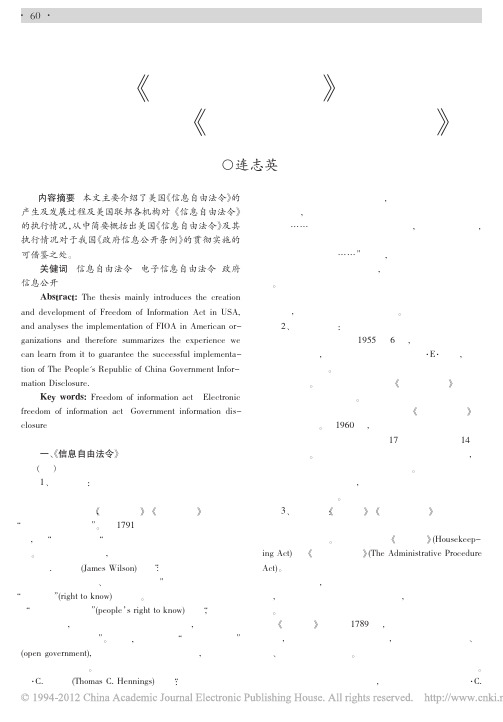
Key words: Freedom of information act Electronic freedom of information act Government information dis- closure
一、《信息自由法令》 ( 一) 产生的背景 1、一对矛盾:公民知情权概念的提出与美国政府对 信息的管制之间的矛盾 美国独立初期《, 独立宣言》 和《 美 国 宪 法》 就 确 立 了 “ 人民主权的原则”。 在 1791 年召开的第一届美国国会 上,围绕“ 国会议事录“ 应否向国民公 开 的 问 题 发 生 了 争 论。 会议参加者之一,后来成为美国最高法院大法官的 詹 姆 斯.威 尔 逊(James Wilson)指 出“: 人 民 有 权 知 道 他 们 的代表正在做什么、已经做了什么”这里第一次提出了 “ 知情权”(right to know)的概念。 后来被人们进一步引申 为“ 人民的知情权”(people’s right to know)概念,“ 为了实 现人民主权,人民不仅有权选举和罢免官员,而且有权对 政府官员进行监督”。 为此, 必须建立“ 公开的政府” (open government),让 人 民 对 政 府 有 较 多 了 解 ,以 实 现 人 民对政府的监督。 正如下文将提到的美国参议院托马 斯·C.亨 宁 斯(Thomas C. Hennings)所 说 :“ 虽 然 在 宪 法 中
中美个人信息保护立法比较研究

Part Five
美国:注重隐私权保护,强 调个人对个人信息的控制权
添加标题
美国:立法体系完善,法律 执行严格
添加标题
美国:企业自律意识强,注 重个人信息保护
美国:个人信息保护立法经 验丰富,可供借鉴
添加标题
添加标题
添加标题
添加标题
中国:注重信息安全,强调 政府对个人信息的保护责任
添加标题
更正权:有权要求更 正不准确的个人信息
添加标题
删除权:有权要求删 除个人信息
添加标题
限制处理权:有权要 求限制个人信息的处 理
添加标题
拒绝权:有权拒绝个 人信息的处理
添加标题
投诉权:有权向监管 机构投诉个人信息处 理不当
添加标题
保密义务:有义务保 护个人信息的安全和 保密
遵守法律法规:遵守中美个人信息保护相关法律法规 保护个人信息:采取必要措施保护个人信息的安全和隐私 告知用户:向用户告知个人信息的处理目的、方式和范围 尊重用户权利:尊重用户的知情权、选择权和拒绝权 配合监管:配合中美个人信息保护监管机构的监管和调查 承担法律责任:违反法律法规承担相应的法律责任
保密性原则:个人信息处理必须采取 保密措施,不得泄露个人信息
准确性原则:个人信息处理必须保证 准确性,不得错误处理个人信息
可追溯性原则:个人信息处理必须可 追溯,不得隐瞒个人信息处理过程
添加标题
知情权:有权了解个 人信息的收集、使用、 存储等情况
添加标题
访问权:有权访问、 查询、复制个人信息
添加标题
立法目的:保 护个人隐私, 维护信息安全
实施效果:中 美两国在个人 信息保护立法 方面存在差异, 但都取得了一
定的成效
美国《情报自由法》的立法历程
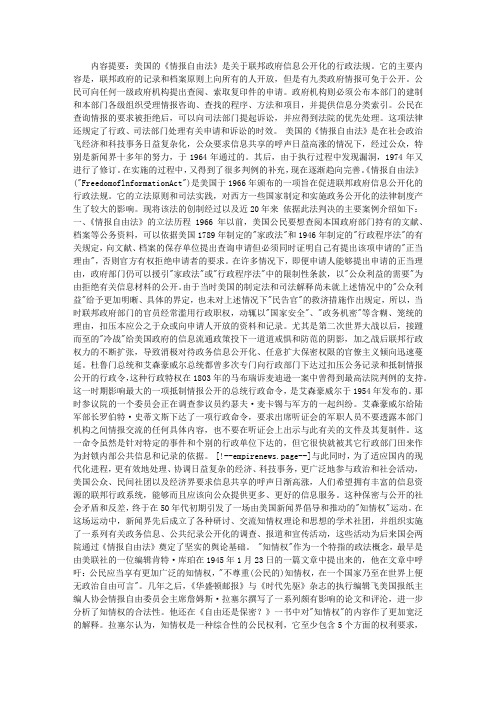
内容提要:美国的《情报自由法》是关于联邦政府信息公开化的行政法规。
它的主要内容是,联邦政府的记录和档案原则上向所有的人开放,但是有九类政府情报可免于公开。
公民可向任何一级政府机构提出查阅、索取复印件的申请。
政府机构则必须公布本部门的建制和本部门各级组织受理情报咨询、查找的程序、方法和项目,并提供信息分类索引。
公民在查询情报的要求被拒绝后,可以向司法部门提起诉讼,并应得到法院的优先处理。
这项法律还规定了行政、司法部门处理有关申请和诉讼的时效。
美国的《情报自由法》是在社会政治飞经济和科技事务日益复杂化,公众要求信息共享的呼声日益高涨的情况下,经过公众,特别是新闻界十多年的努力,于1964年通过的。
其后,由于执行过程中发现漏洞,1974年又进行了修订。
在实施的过程中,又得到了很多判例的补充,现在逐渐趋向完善。
《情报自由法》("FreedomoflnformationAct")是美国于1966年颁布的一项旨在促进联邦政府信息公开化的行政法规。
它的立法原则和司法实践,对西方一些国家制定和实施政务公开化的法律制度产生了较大的影响。
现将该法的创制经过以及近20年来依据此法判决的主要案例介绍如下:一、《情报自由法》的立法历程 1966年以前,美国公民要想查阅本国政府部门持有的文献、档案等公务资料,可以依据美国1789年制定的"家政法"和1946年制定的"行政程序法"的有关规定,向文献、档案的保存单位提出查询申请但必须同时证明自己有提出该项申请的"正当理由",否则官方有权拒绝申请者的要求。
在许多情况下,即便申请人能够提出申请的正当理由,政府部门仍可以援引"家政法"或"行政程序法"中的限制性条款,以"公众利益的需要"为由拒绝有关信息材料的公开。
由于当时美国的制定法和司法解释尚未就上述情况中的"公众利益"给予更加明晰、具体的界定,也未对上述情况下"民告官"的救济措施作出规定,所以,当时联邦政府部门的官员经常滥用行政职权,动辄以"国家安全"、"政务机密"等含糊、笼统的理由,扣压本应公之于众或向申请人开放的资料和记录。
美国《隐私权法》与公民个人信息保护

美国《隐私权法》与公民个人信息保护美国《隐私权法》与公民个人信息保护摘要本文介绍了美国《隐私权法》的立法原则、适用范围、个人记录公开的限制和登记、公民查询与修改个人记录的权利、对行政机关的限制与要求、免除适用的规定、该法与美国《信息自由法》的关系;论述了我国研究和借鉴国外隐私权保护的法律法规,强化政府信息法制建设力度,在确保国家和公共利益的前提下依法保护公民个人信息的必要性。
关键词隐私权法个人信息信息公开信息安全政府1974年12月31日,美国参众两院通过了《隐私权法》(ThePrivacyAct)[1],1979年,美国第96届国会修订《联邦行政程序法》时将其编入《美国法典》第五编“政府组织与雇员”,形成第552a节。
该法又称《私生活秘密法》,是美国行政法中保护公民隐私权和了解权的一项重要法律。
就政府机构对个人信息的采集、使用、公开和保密问题作出了详细规定,以此规范联邦政府处理个人信息的行为,平衡公共利益与个人隐私权之间的矛盾。
1立法原则《隐私权法》立法的基本原则是:①行政机关不应该保有秘密的个人信息记录;②个人有权知道自己被行政机关记录的个人信息及其使用情况;③为某一目的而采集的公民个人信息,未经本人许可,不得用于其他目的;④个人有权查询和请求修改关于自己的个人信息记录;⑤任何采集、保有、使用或传播个人信息的机构,必须保证该信息可靠地用于既定目的,合理地预防该信息的滥用。
2适用范围《隐私权法》对该法出现的“机关”、“人”和“记录”等概念的适用范围做出限定。
2.1机关(agency)该法中的“机关”,包括联邦政府的行政各部、军事部门、政府公司、政府控制的公司,以及行政部门的其他机构,包括总统执行机构在内。
该法也适用于不受总统控制的独立行政机关,但国会、隶属于国会的机关和法院、州和地方政府的行政机关不适用该法。
2.2人(individual)该法中的“人”,是指“美国公民或在美国依法享有永久居留权的外国人”。
电子政务理论与方法第四版课件第2章国外电子政务进展与启示

• 2002年11月,英国政府公布了《地方电子政务发展国家战略》,对英国地方电子政务的 发展进行了规划,并出台相关政策指导地方电子政务发展。
• 2005年11月,英国政府公布了《以技术推动政府变革》。2006年4月,英国政府颁布了 《〈以技术推动政府变革〉实施计划》。
美国ቤተ መጻሕፍቲ ባይዱ
2.1
• 美国是现代信息技术的发源地,也是世界上电子政务起步最早的国家。早在 1993年,克林顿政府就把构建“电子政府”作为其施政改革的一项重要内容, 并成立了国家绩效评估委员会,使美国民众有更多的机会、以更有效的方式 获取公共服务。1996年,克林顿政府启动了“重塑政府”计划,提出到2003 年让美国联邦政府部门全部上网,使美国民众能够充分获取联邦政府的各类 信息。1997年,克林顿政府制订了“走近美国”计划,要求从1997年到2000 年,在电子政府方面完成120余项任务;到21世纪初,公共服务全部实现电子化, 政府工作效率有极大的提高。
• 2009年3月,奥巴马政府设立了联邦政府首席信息官(CIO)一职,并任命昆德拉为联邦政府首席信息 官。
• 2009年3月,美国联邦总务管理局签署了一份允许政府各部门在YouTube等四个社交类网站上发布 可共享内容的协议。
• 2009年5月,奥巴马签署了《开放政府指令》。这是美国政府提倡的在互联网上发布更多信息的计 划。该计划的目的是鼓励联邦部门公布更多现有的、符合《信息自由法案》(Freedom of Information Act)的信息,并使公众更容易获取此类信息。
• 至2005年底,“联邦在线2005”计划圆满结束,并取得了显著成效。 • 2006年,德国内政部CIO办公室制订了“E-Government 2.0”计划。该计划旨在让更多的德国企
美国联邦政府科学数据管理政策及实践

美国联邦政府科学数据管理政策及实践王炼【摘要】数据开放是美国政府长期执行的重要国家战略,是联邦政府科研管理和鼓励开放创新的重要内容,也是美国促进科技发展、提升创新能力和创新效率的重要手段.多年来美国建立了国会立法、联邦政策和部门规章三层面的制度框架,将数据开放共享的理念贯穿整个科研项目管理周期,并与时俱进、不断更新,保证了联邦资金效率和影响最大化.【期刊名称】《全球科技经济瞭望》【年(卷),期】2018(033)007【总页数】5页(P47-51)【关键词】美国;数据开放;科学数据管理【作者】王炼【作者单位】中国科学技术交流中心,北京 100045【正文语种】中文【中图分类】G311科学数据是从事科技活动所必需的重要信息资源。
随着现代科学技术的迅猛发展,学科交叉融合加快,海量科学数据呈井喷式增长。
有效地收集、管理、开放和共享科学数据,能够避免重复研究、降低科研成本、提高国内和国际研究人员的参与度,从而提升研究效率,推动创新创业和科技经济发展,其重要性和经济影响已经被越来越多的国家所公认。
美国在开放科学数据方面走在世界前列,早在20世纪80年代,里根政府就曾提出收集国家科学基金会支持的研究项目所产生的所有数据并将其商业化,但该举措当时仅涉及一个部门,成效有限。
奥巴马政府认为开放数据不仅有助于确保政府的公开、透明和负责,且有助于促进创新创业、科学发展并带来其他公共利益,因此包括科学数据在内的数据开放成为美国政府近年来力推的一项重要举措,各联邦部门都积极制定扩大公共资助研究成果开放获取的方案。
1 美国科学数据管理的立法及政策体系自20世纪中叶起,联邦政府就开始设计和建设数据资源开放的相关法律框架和政策体系,为科学数据开放共享奠定坚实的制度基础。
1.1 数据开放的法律基础1966年美国颁布实施的《信息自由法》(Freedom of Information Act, FOIA)开创了联邦政府信息公开化的先河,成为联邦政府促进政府数据和信息资源公开的范例。
- 1、下载文档前请自行甄别文档内容的完整性,平台不提供额外的编辑、内容补充、找答案等附加服务。
- 2、"仅部分预览"的文档,不可在线预览部分如存在完整性等问题,可反馈申请退款(可完整预览的文档不适用该条件!)。
- 3、如文档侵犯您的权益,请联系客服反馈,我们会尽快为您处理(人工客服工作时间:9:00-18:30)。
美国信息自由法案(2002年修正本)美国法典第5篇第552节第552节:公共信息;机关规则、意见、命令、记录和程序:(a)各机关必须使公众能够得到以下信息:(1)作为对公众的指南,各机关应在联邦登记处将以下信息予以分别说明并及时公布:(A)总部及分部的介绍以及公众可以在哪些指定地方,通过什么方法,可以向该地方的雇员(如果是穿制服的机构,那么为公职人员)获取信息、提出要求或获取答复;(B) 阐明开发并确立本机关之各项功能的整体过程及办法,包括所有现行的正式与非正式的办事程序之性质和必备的条件;(C)程序规则,可获取的表格介绍或获取表格的地点及所有文件、报告或检查记录的范围与内容的指导;(D)本机关根据法律授权制定的普遍适用的实体规则,本机关制定和采取的基本政策的说明,或本机关采取的普遍适用的解释的说明;(E)上述各项的改正、修订或撤消。
对于某些需要在联邦登记处公布但还未公布的信息内容,任何人不得以任何方式要求利用此信息内容,也不得使任何人受该信息内容的负面影响,除非此人已及时得到确切的关于使用此信息内容之条件的通知。
某些对于相关人士应予以获取的信息内容,在得到联邦登记处主任的批准后,应视为已在联邦登记处公布。
(2)依据已公布规则,各机关有义务提供给公众进行查阅与复制的公开信息有:(A)在案件裁决中做出的最后意见,包括赞成与反对意见及裁定书;(B)那些被本机关所采纳的未在联邦登记处公布的政策声明及其解释;(C)职员手册和对职员的指示,其中影响公众的部分;(D)依据(a)分节第(3)款,向数人公开后,由于其内容的关系,本机构决定使他们成为或将成为今后公开的任何形式或格式的文件复制件;(E)本款(D)分款中提及的文件的综合索引。
除非上述文件被及时地公布以及它们的副本供出售,对于1996年11月1日或此后形成的文件,本机构在一年之内应予以公布,包括通过计算机远程通讯手段等设备向公众公布,如果没有该设备,可用其它的电子手段。
在机构公开或公布意见、政策声明或解释、职员手册及指示或本款(D)分款中提及的文件复制件时,为防止未经授权侵犯个人隐私, 机关可删去有关暴露个人身份的细节,删去的正当理由应书面详细解释清楚,且删去部分要在公布的文件中标出,除非此类标识将损害到(b)分节中所提到的豁免保护的利益。
如果技术允许,删去的程度应在被删处标出。
每个机构还应提供现行索引以供公众查阅与复制,该索引应为公众标明自1967年7月4日以后发布的、采取的、或颁布的、根据(a)分节第(2)款规定的应对公众提供利用或必须公开的全部文件。
每一机关应按季度或在更短的周期内,迅速公布并通过出售或其它方式散发每期的索引及其补编,除非该机关决定没有出版索引的必要和可能。
这个决定必须在联邦登记处公布,在这种情况下,该机关仍然必须根据公众的请求,提供该项索引的副本,收取不超过复制该索引的直接成本费。
各机关应于1999年12月31日前通过计算机远程通讯手段公布本法案(a)分节第(2)款(E)分款提及的现行索引。
最终的裁定、意见、政策的声明、解释、对公众有影响的职员手册或指示,只在下述情况下才可以作为机关的依据,作为判例援引、使用、以对抗非机关的当事人:(i)上述文件已被编入索引,并按本款的规定提供公众使用或公布;(ii)或者当事人已就文件的内容得到实际的及时的通知。
(3)(A)除按(a)分节第(1)、(2)款规定提供公众利用的记录及(a)分节第(3)款(E)分款规定的情况以外,每一机关在收到要求提供记录的申请时,必须对任何人迅速提供他所需要的记录,但公众的申请必须:(i)合理地说明所需要的记录;(ii)符合机关公布的法规中规定的时间、地点、费用(如果有的话)和应当遵守的程序。
(B)依据本款要求,为使公众获取信息,各机关应以任何申请人要求的形式或格式提供文件,如果该文件易于以该形式或格式复制的话。
各机关应尽适当的努力维持文件的形式或格式的原样。
(C)在尽量不妨碍自动化信息系统运行的基础上,各机关应尽适当的努力去查找电子形式或格式的文件。
(D)本款中的“查找”一词是指用手工或自动的方法查找机关的材料,以发现申请人需要的材料。
(E)依据本款条款,隶属于情报机构的机关或机关中的个别部门[该定义见1947年国家安全法第3(4)节条款],不对以下机构开放信息----(i) 除州、地方、联邦、美国地区或及其属下的分部门以外的任何政府实体;(ii) 条款(i)所指的政府实体的代理机构。
(4)(A)(i)为执行本法案的规定,各机关应按照通知和收集公众评论程序颁布法规,具体规定适用于操作的处理信息申请的收费表,并设立放弃与减免收费的程序与准则。
收费表的标准应符合行政管理与预算局局长按照通知和收集公众评论程序制定的指导方针,该方针必须规定一个统一的标准,以适用于一切机关的收费。
(ii)机关制定的法规中必须规定----(I) 如果要求的文件是用于商业目的,文件的查找、复制和审查的收费应限于合理的标准价格;(II)如果文件用于非商业目的,而是用于教育或非盈利的科学机构(其目的是用于学术或科学研究方面)或新闻媒体的代理机构,文件复制的收费应限于合理的标准价格;(III)不属于(I)或(II)类要求,文件查找与复制的收费应限于合理的标准价格。
(iii)如果信息的公开有利于公众的利益,便于他们更能了解政府的活动与运行,而不仅仅只具有商业利益的话,机关应以不收取任何费用或低于第(ii)条收费标准的价格将文件提供给公众。
(iv)价目表应规定只收取查找、复制或审查的直接成本费用,审查成本费用应只包括依据本法案,机关确定该文件是否须开放的初检及依据本法案,机关收回豁免开放部分的文件的直接成本费用。
审查费用不应包括解决依据本法案处理公众信息申请过程中引起的法律或政策问题的任何成本费用。
依据本法案,任何机关不得在以下情况收取任何费用----(I)如果按常规的方法收款或得到该款的手续,所花的费用等于甚至超过应收的金额,或者(II)依本分款中款项(ii)中的(II)或(III)提出的信息申请,属于可在2小时以内完成查找或复制的信息在100页以内的。
(v)任何机关不得预先收取任何费用,除非申请人以前有过未及时付费记录,或收费超过250美元的。
(vi)本分款中的任何一条都不得替代某一法律对特殊类型文件规定的收费标准。
(vii)法院对申请人关于本法案规定的放弃收费所提起的任何诉讼,应重新审理,但法院对案件的审查不能超过机关的记录。
(B)原告起诉时,原告居住、商务所在地或机关文件所在地的美国地区法院或哥伦比亚特区法院有管辖权禁止机关封锁机关的记录,并可命令机关提供任何不正当地对原告封锁的机关记录。
对这类案件,法院应重新审理,可以不公开地审查该机关记录的内容,以决定该记录或其中任何部分,是否确实属于本法案(b)分节中所规定的豁免范围,该机关是否应承担其行动的责任。
除了对其它事宜给予足够重视之外,对于机关就依据(a)分节第(2)款(C)分款、(b)分节的技术可行性及(a)分节第(3)款(B)分款中提及的可复制性所作出的决定的证明书,法院也应该给予足够的重视。
(C)不论法律有任何其它规定,被告在收到原告根据本法案(a)分节提出的任何控诉后的30天内,必须作出答复或答辩,除非法院基于正当理由,另有其它指示时例外。
(D)[依公法98-620号予以撤消](E)根据本法案的规定提起的诉讼案件,如果原告已经实质上胜诉,法院可以判决美国负担合理的律师费用,和由案件产生的其它合理的诉讼费用。
(F)当法院命令对原告提交任何不适当地封锁的机关记录,并判决美国负担合理的律师费和其它诉讼费用时,如果法院另外又发出一个书面的裁定,指出封锁记录的情况产生,机关工作人员的封锁行为是否属于专横的或任性的行为时,特别律师必须迅速采取行动,以确定对拒绝提供文件负主要责任的官员或职员,是否需要采取纪律制裁,特别律师在调查和考虑提交的证据以后,必须向有关机关的行政当局提出自己的结论和建议,并将该结论和建议的副本送交应负责任的官员或职员或其代理人。
行政当局应采取特别律师建议的矫正措施。
(G)如果发生不服从法院命令的情况,地区法院对负责任的职员可以科处藐视法庭罪,如果是穿制服的机关,则处罚其负责的成员。
(5)有一名以上工作人员的政府机关应保管好每次会议中每个成员的最后表决的记录,以备公众检查。
(6)(A)各机关,对于依据(a)分节第(1)、(2)或(3)款提出的任何文件申请,应----(i)在收到任何这样申请后的20天内(星期六、日和法定节假日除外)确定是否同意满足这样的申请,并应立即通知申请人机关的决定、作出该决定的理由、以及申请人对该决定不服时,有权向机关首长申诉;(ii)机关在接到这样的申诉后,必须在20天内(星期六、日与法定节假除外)作出决定,在申诉时,如果原来拒绝提供文件的决定得到全部或部分的维持,机关应告知申请人对该决定可依(a)分节第(4)款规定申请司法审查。
(B)(i)在本分款规定的特别情况下,分款(A)中的条款(i)、(ii)规定的时间期限可延长,通过书面通知文件申请人说明延期的理由及预定作出决定的日期(一般不得延长10个工作日,除非是遇到如本分款第(ii)条所提及的情况)。
(ii)就依据分款(A)下条款(i)的规定而做出的延长时间期限的书面通知,如果机关不能在条款(i)规定的时间期限内处理申请的话,机关应在该书面通知中,告知申请人并提供申请人一个机会,让其限定申请范围,以便机关可以在限定期限内完成处理工作,或提供申请人一个机会,使之可与机关商定安排一个处理申请(或修正后申请)的时间期限的机会。
如果要求者不同意合理修正申请或协商安排时间期限,机关可将之作为决定其是否属于分款(C)所提及的“特殊情况”之一。
(iii)本分款所说的“特殊情况”,仅限于适当处理特殊的申请时合理的需要,即:(I)处理该申请的机关需要从远离本机关的地方设施或其它的组织中,查找或收集所申请的文件;(II)需要查找、收集与适当审查的是个人要求的不同类别的大批量文件;(III)需要同决定该项申请有重大利益关系的其它机关进行尽可能快的协商或者机关内部两个或两个以上的组成单位之间有重大的管辖利益,需要尽可能快的协商。
(iv) 各机关可按照通知和收集公众评论程序颁布规章,规定如果机关认为这样的申请实际上是同一性质的申请,这种申请又符合本分款提及的特殊情况,且这些申请的文件又都是明显相关的话, 可对一个或多个申请人提出的申请进行汇集。
多种不相关的文件申请不在汇集之列。
(C)(i)依据本法案(a)分节第(1)(2)或(3)款条款,向任何机关申请文件的人,在机关不遵守本款规定的可实行的时间期限时,视为已经穷尽行政救济。
